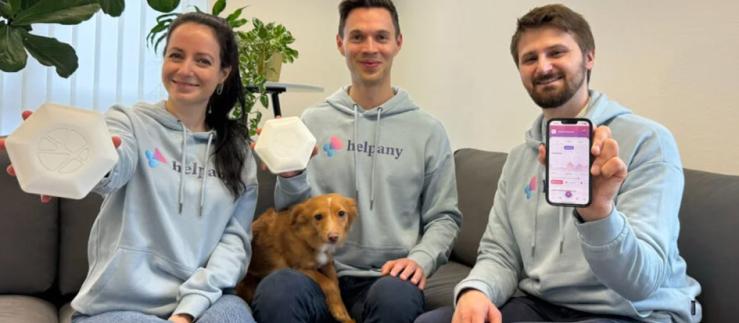Start-ups represent an important factor in the innovative strength of the Greater Zurich Area. They ensure that Greater Zurich, in its role as a business location, has the capacity to further expand its globally leading position in cutting-edge technologies. In this context, it must also be stated that the region’s universities of applied sciences contribute to this by way of their applied research and practical orientation. In this way, both the Zurich University of Applied Sciences (ZHAW) and Zurich University of the Arts (ZHdK) have developed channels aiming to efficiently support and promote prospective young entrepreneurs and emerging start-ups.
Machine Learning for tailor-made clothing
Verena Ziegler is only too aware of how valuable this is. “Here in Zurich people have a very open mind towards research”, comments the Co-Founder of the project OpenDress - algorithmic sewing patterns. For seven years she has worked in the Department of Design at ZHdK, seeking to develop a solution to the ever-growing mountain of waste as a result of the “fast fashion” craze and end-of-season designs. To this end, she has turned to Machine Learning with the aim of manufacturing tailor-made clothing on the basis of 3D scans.
The technology, which has been patented since 2019, is now being circulated in the form of the start-up BeWear, which offers fashion retailers an app that can be integrated in their existing range. “We consciously opted for what is known as a ‘white label solution’. In this way, we are in a better position to reach a greater number of consumers and can switch current production processes more rapidly over to automated dress designs”, Ziegler explains. She is confident with regards to the implementation process: “Due to the history of the textiles industry in Switzerland in particular, people here are highly innovative and interest is high. We are being met with less resistance here than abroad”. The project is being supported by the Swiss National Science Foundation (SNF) and Innosuisse, the Swiss government’s promotional agency.
BeWear is far from a unique case. The ZHdK has developed its own channel to support projects devised by its members and alumni in the form of the Z-Kubator. “We take start-ups under our wing above all in dealing with business questions, mainly due to the fact that the students themselves bring innovation at the interface of design and technology to the table”, comments Philipp Kotsopoulos, Director of Z-Kubator.
From research project to spin-off
At the Zurich University of Applied Sciences (ZHAW), which is based in Winterthur, the transfer into the start-up ecosystem is also handled seamlessly. Dr. Mauro Sette was originally the coordinator of the ZHAW cooperation project entitled SCATh – Smart Catheterisation. The purpose of this project was to develop visual and haptic tools for minimally invasive surgical procedures to facilitate safe catheter insertion.
Upon the completion of the SCATh project, Sette opted to establish a spin-off. “The transition to our start-up was sealed with a friendly agreement”, explains the founder of the Winterthur-based MedTech firm Medyria. “ZHAW supported us on our journey for around a year and we were able to continue using the infrastructure until we moved to Technopark Winterthur”.
Here, too, Sette benefits from a close connection with the ZHAW. It allows his company to hire talented students even before they have completed their finals time and again. Sette views this exchange as essential: “As a company we are repeatedly forced to focus on a single, specific issue in full. For this reason, it’s important to remain at the cutting-edge of research via the university”.
Community: the foundation of the ecosystem
In addition to cooperating with the university, Thomas Schumann claims that creating an effective business network between firms is also crucial. “We maintain a rich ecosystem here, where companies meet at different stages of their development”, the Managing Director of Technopark Winterthur explains. In order to accommodate start-ups, the Technopark has launched the start-up incubator RUNWAY in conjunction with the ZHAW and the Cantonal Bank of Zurich (ZKB). This organization supports project teams by providing premises and coaching. Schumann and Sette are in agreement that Technopark Winterthur offers the ideal environment for the exchange of ideas – especially during such challenging times: “The community is the foundation for our ecosystem”, Schumann concludes.
by Smilla Diener
This success story was first published by Greater Zurich Area Ltd (GZA).







